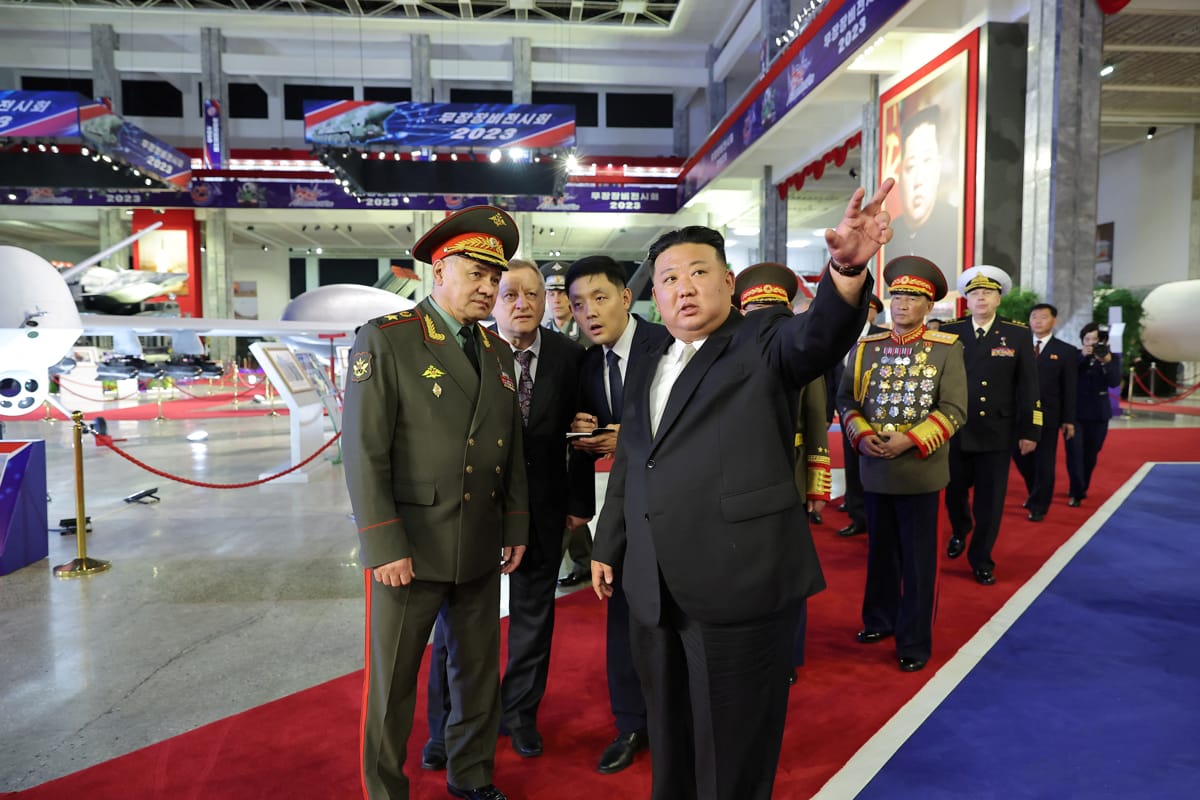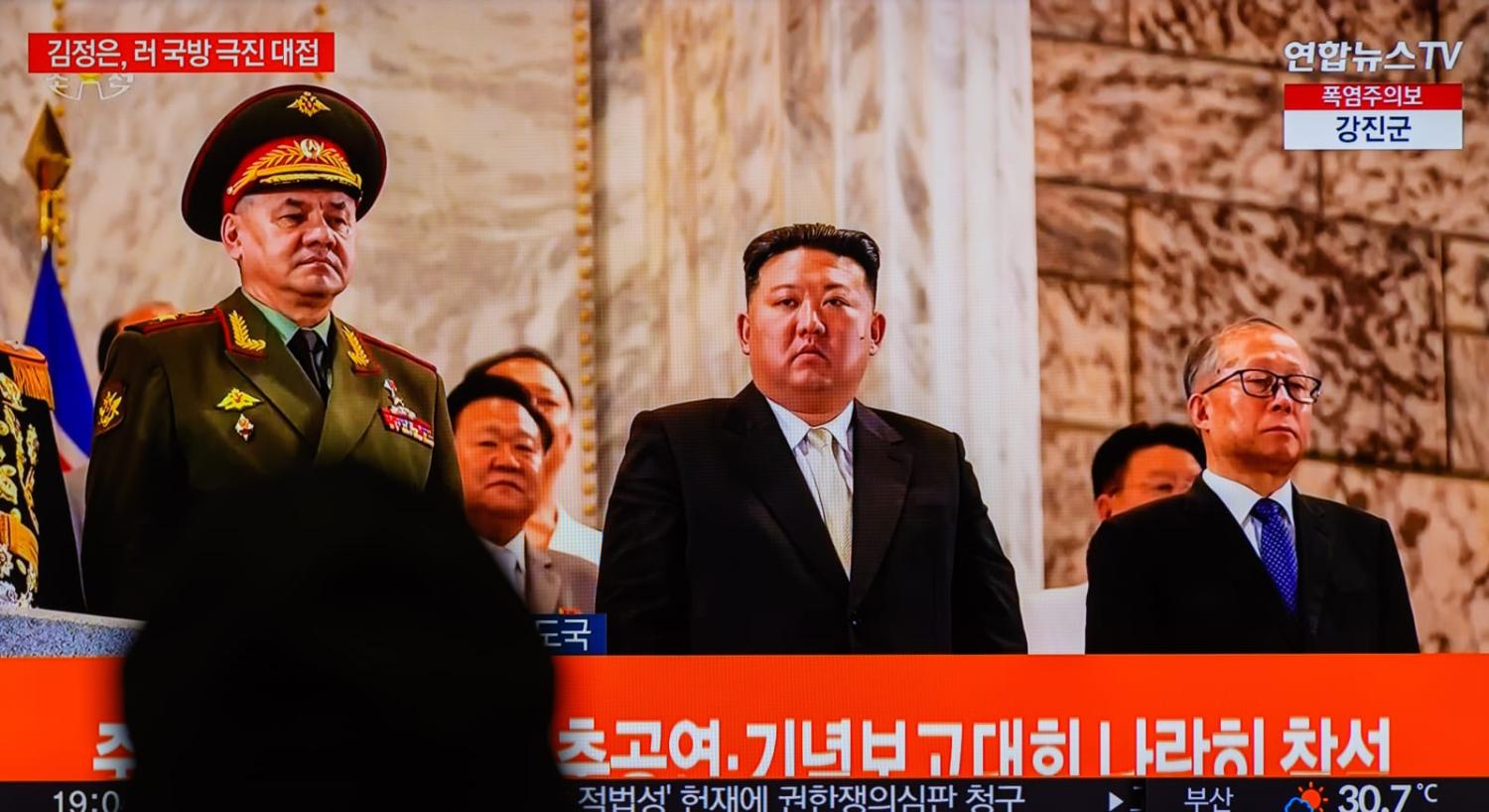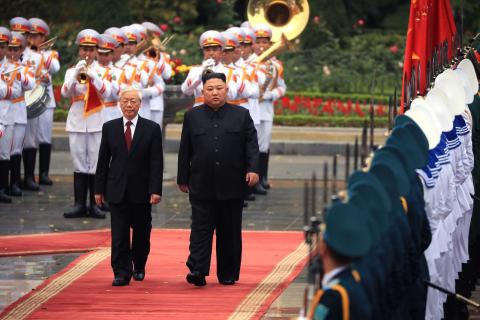For the first time since the start of the pandemic, North Korea last week welcomed foreign visitors to Pyongyang, to celebrate the 70th anniversary of the Korean War Armistice Agreement, an occasion that the North sees as a victory against “imperialist” forces, particularly the United States.
Although Kim Jong-un invited delegations from China and Russia, particularly noteworthy was Moscow’s decision to send Defence Minister Sergei Shoigu. Such a high-level official highlighted interest in extending ties with North Korea at a time when Russia is increasingly isolated from the international community.
The Russian delegation arrived in Pyongyang on Tuesday and held a series of meetings with their North Korean counterparts the following day. Kim accompanied Shoigu to a weaponry exhibition, which included nuclear-capable missiles and new military drones. The showcase could be part of a North Korean sales pitch to try and sell Russia weapons for use in Ukraine, something the United States has already accused Pyongyang of doing. The visit also served to demonstrate to the world that the North has friends that accept and even admire its nuclear state status.

South Korea’s Foreign Ministry was quick to respond to Shoigu’s visit, emphasising that “any types of weapons trade with North Korea is banned under UN Security Council resolutions” while adding that it is “closely monitoring” defence talks between Russia and North Korea. Meanwhile, the United States confirmed last month that Pyongyang had already completed a delivery of infantry rockets and missiles to the Wagner Group.
Later on Wednesday, a reception was held for the Russian delegation. At the dinner, North Korean Defence Minister Kang Sun-nam expressed his country’s “full support for the just struggle of the Russian army and people to defend the sovereignty and security of the country”, a reference to Russia’s war in Ukraine. In response, Shoigu said the Korean People’s Army (KPA) “has become the strongest army in the world” while expressing “the will of the Russian Federation to boost many-sided cooperation with the [Democratic People’s Republic of Korea].” Taking a jab at Washington, Shoigu suggested that “the present conflicting international military and political situation requires the armies of the two countries to resolutely stand against the US brigandish strategy for world supremacy and further strengthen their mutual cooperation and collaboration on the principle of defending the national sovereignty and interests.” It’s a view Pyongyang and Moscow share, which will likely help boost relations even further.
On Thursday, Shoigu directly relayed a message from Putin to Kim, the contents of which were published by North Korean media on Friday.
The Democratic People’s Republic of Korea’s firm support to the special military operation against Ukraine and its solidarity with Russia on key international issues highlight our common interests and determination to counter the policy of the Western group which hinders the establishment of the truly multipolarised and just world order based on the inseparability of the predominance of the international law and security, and the respect for the sovereignty and national interests of the states.
Putin’s letter illustrates that while North Korea supports Russia’s war efforts in Ukraine both politically and militarily, Pyongyang is also granted Moscow’s support in the international arena. With Russia and China – two permanent UN Security Council members – on its side, American-led efforts at deterrence and pressure targeting North Korea are increasingly futile.
In his Victory Day speech on Thursday, North Korea’s Defence Minister Kang accused the United States of “intensively forming aggressive military blocs” with South Korea and Japan while warning Washington they would have “no room of choice of survival” in case they use nuclear weapons against the North. This came as Japan approved a new defence white paper on Friday, referring to China, Russia and North Korea as contributing to “the most severe and complex security environment since the end of World War II”.
Blocs are indeed solidifying in the region, with the United States holding missile defence exercises with South Korea and Japan while Russia and China take part in joint air patrols and joint naval exercises.
It seems that, 70 years after the signing of the Armistice, the Korean Peninsula remains divided along the same lines, with perhaps even less hope today of achieving peace through diplomacy than in 1953.

